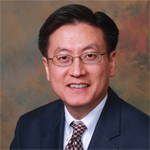Q: What advice do you have for the next generation of rheumatologists?
A: Despite mounting bureaucratic and economic challenges in academic life and in practice, don’t lose sight of what a privileged existence we lead. Appreciate your good fortune.
Q: If you could change one thing about the field of rheumatology, what would it be?
A: There are still large segments of our country underserved by rheumatology, especially in pediatrics, and in rural and economically disadvantaged communities. The workforce needs to expand and to substantially increase in racial and ethnic diversity.
ACR Distinguished Service Award
 Sam Lim, MD, MPH, Associate Professor of Medicine and Epidemiology/Clinical Director, Division of Rheumatology, Emory University School of Medicine; Chief of Rheumatology, Grady Health System, Atlanta
Sam Lim, MD, MPH, Associate Professor of Medicine and Epidemiology/Clinical Director, Division of Rheumatology, Emory University School of Medicine; Chief of Rheumatology, Grady Health System, Atlanta
Background: Dr. Lim wishes more pre-med and medical students were exposed to the field early on, like he was, courtesy of a lupus lecture in his second year of medical school.
“Rheumatology has all the excitement of other fields and sometimes more,” he says. “We need to do a better job of engaging the world’s best and brightest.”
A native of Seoul, South Korea, who grew up in St. Louis and has trained in North Carolina and Brooklyn, N.Y., Dr. Lim directs the Grady Lupus Clinic and is the principal investigator of the Georgia Lupus Registry, a population-based registry funded by the Centers for Disease Control and Prevention (CDC). He is the consortium chair for The Lupus Initiative and received the ACR Clinical Investigator Fellowship Award from 2004–07.
He also holds research grants from the National Institutes of Health and the CDC.
‘Rheumatology has all the excitement of other fields & sometimes more. We need to do a better job of engaging the world’s best & brightest.’ —Dr. Lim
Q: What is it about rheumatology that keeps you engaged?
A: Rheumatologic conditions touch so many aspects of life and the individual. In order to tackle my passion of reducing racial health disparities in lupus, we cannot focus on just one thing. Life isn’t that simple. A minority individual living with lupus represents biologic factors that drive toward more severe disease, which are obviously very important. But the biology is altered through access [of] the healthcare system, the quality of care received and layers of social determinants of health. At the risk of spreading oneself too thin, I think it is imperative that we strive for excellence, clinically and in research on all fronts. I’m extremely fortunate to be in an environment where I can explore these areas on multiple fronts.



